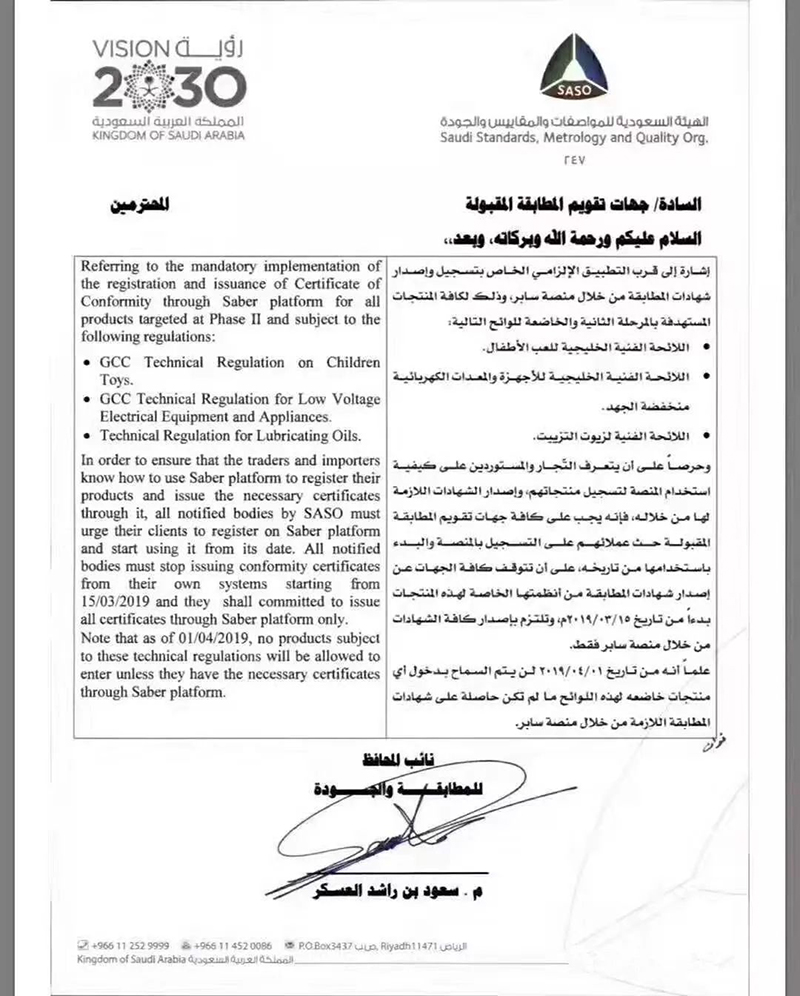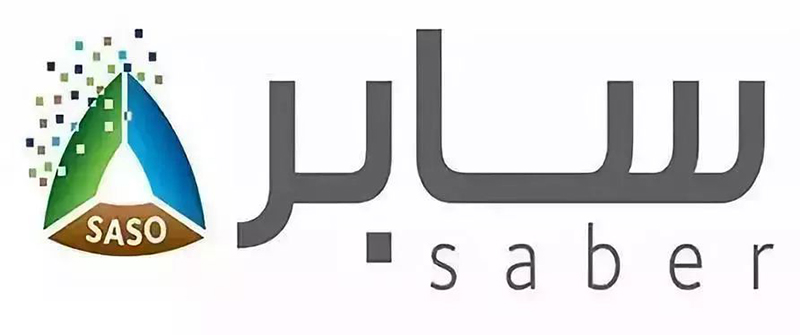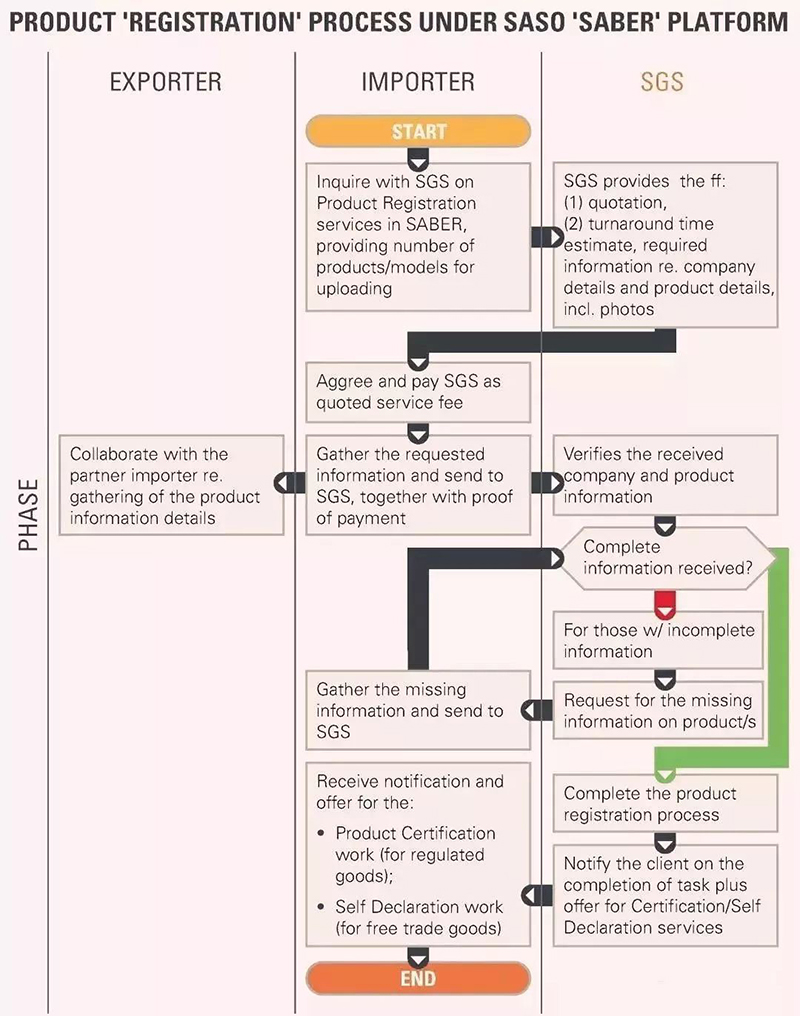Saudi new regulations, SABER implementation
Latest Saudi requirements:
Products within GCC are exported to Saudi Arabia. After March 15, 2019, the certification body will no longer issue COC certificates. Products must be registered on the SABER system. After April 1, 2019, products that are not registered on the SABER system will not be cleared.

On April 1, SABER was formally implemented. The first batch of controlled products were low-voltage appliances, children's toys and lubricants. The above products can only be shipped through SABER to apply for SC from April 1, otherwise they will not be able to clear customs. Compliance certificates issued by the SABER platform must be held before customs clearance can be carried out at Saudi Customs. Other products that have not been regulated for the time being are still shipped by SASO.
Low Voltage Device-GSO Low Volumes Development Technology Review
(Covers products in GSO list 2 GCC review)
Toy Products-GSO Toys Technology Registration
(and need to apply for GSO compliance retrospective identification(GSO Conformity Tracking Symbol, GCTS))
Lubricating oil-SASO Technical Assessment for Lubricating Oils
What is SABER? SABER Certification Change Points? What is the SABER authentication process?

What is SABER Certification?
SABER certification refers to a conformity assessment plan for non-Saudi domestic enterprises(i.e., enterprises exporting to Saudi Arabia). Therefore, for Chinese export companies, it is necessary to pay attention to the SABER certification program.
SABER is a newly introduced upgraded version based on the original SASO certification and is also a new certification recognition plan that will replace SASO certification.

Major changes in SABER certification
SABER is a new assessment project for conformity certification of products and batches to Saudi Arabia. The importance of the Saber certificate is to confirm that the product complies with Saudi standards and norms and to protect investors from fraud when importing any high-risk or medium-risk product, while preventing false and substandard products and ensuring that the product does not affect the health and safety of consumers.
SABER Certification is a new online application system introduced by SASO. SABER is actually a network tool for product registration, distribution and acquisition of conformity CoC certificates.
According to SABER, the product will be divided into: high-medium-low according to the risk category; Depending on the risk category, different conformity testing procedures will be used and will be carried out by different accredited bodies.
III. SABER certification process
Stage 1: PC Certificate(Product Compliance Certificate)
1. Importer Registration SABER Platform System Account
SABER URL: Https://saber.sa/
2. Importers enter application information into SABER
The information that SABER importers need to enter for registration includes:
-- Name and address of the importer's company
-- The importer's commercial registration number CR Number
-- Contact name, position, electronic signature
-- Name and post of person in charge, electronic signature
-Personal ID.
3. Importers select a conformity assessment certification body in the SABER platform system
4. Payment of PCOC Certificate
5. Certification bodies receive applications to contact manufacturers / exporters for certification documents
6. Evaluate the authentication documents and submit the approved documents to the SABER platform;
7. SABER Platform issues PCOC certificates online, valid for 1 year.
Stage 2: SCOC Certificate(Shipment Compliance Certificate)
1. Importers submit SCoC applications to SABER;
2. Verify controlled products and verify the validity of the PCOC certificate;
3. Payment of SCoC fees;
4. SABER Platform issues SCoC certificates online and the certificates are valid only for the goods imported from that batch.
The SABER system divides product certification applications into three steps:
1. Product Rising application for product registration;
2. Product Certification application;
3. Shipment Certification application batch certificate.
Among them, product liting is a voluntary application. Production(PC) and Shifting(SC) are mandatory applications.
The product must first apply for a PC certificate, and then apply for SC certificate for each batch of goods when shipping. These two certificates are the necessary customs clearance documents for the entry of the goods into Saudi Arabia.
The certificate fee is charged online by SASO through the SABER system. SC certificates for each shipment will also be fixed charges, no longer based on the value of the goods as in the past COC.

SABER application process
With regard to the SABER Compliance Certification Scheme:
SABER is an integrated system of regulations, technical requirements and control measures. Its goal is to ensure the safety of domestic products and imported products.
It is also aimed at ensuring that the legislative and regulatory authorities are able to provide effective services through this measure to ensure the safety of products in accordance with technical regulations, in particular basic technical regulations relating to health, safety, environment and energy protection.
About Saudi SASO Certification

Saudi Certification Profile:
The Kingdom of Saudi Arabia is the largest country in the Middle East. It is located in the Arabian Peninsula, West of the Red Sea and east of the Gulf of Perth. It is one of the largest 20 economies in the world; The world's twelfth largest exporter; Twenty-second World Conference of Importers; The largest economy in the Middle East; Third world economic development of the main country; Member of the World Trade Organization, international organizations and Arab organizations. Since 2006, China has become the second largest import trading partner in Saudi Arabia, and bilateral trade has been frequent. Organic electric products, clothing, shoes and hats, textiles and household appliances are the main commodities exported to the country.
So what is it?
SASO is an abbreviation of the English Saudi Arabian Standard Organization. SASO serves as a national standard for all daily necessities and products. The standards also touch on measurement systems and logos. Saudi Arabia's Ministry of Industry and Commerce and SASO requested all SASO certification standards to include products with SASO certification certificates when entering Saudi Customs. Products without SASO certificates will be refused entry by the Saudi Customs.
SALEEM and SABER, SASO, three relationships?
1. SALEM and SABER are newly introduced upgraded versions based on the original SASO certification, and are also new certification recognition plans that will replace SASO certification.
2. SABER Certification Program is an integrated system that integrates regulations, technical requests, and control measures. Its purpose is to ensure the safety of imported products and imported products.
3. SABER is an online network system tool introduced by the Saudi Authority for the registration, issuance and acquisition of certificates of conformity. According to SABER, different contract testing procedures are used according to risk categories and will be implemented by recognized institutions.
SABER certification replaces Saudi SASO certification
The SABER certification to be issued by Saudi Arabia(the joint certification evaluation plan for non-Saudi foreign enterprises that are exported to Saudi Arabia) and the SALEEM certification(the joint certification evaluation plan for Saudi foreign foreign enterprises that are suspended) have begun to be implemented. Saudi SASO certification and Saudi SASO-COC certification will gradually be replaced.
In fact, it has long been reported that from January 1, 2018, the SABER certification and SALEEM certification program to be issued by Saudi Arabia will begin implementation, and SABER certification will be parallel to SASO certification for a period of time. At present, the plan has been delayed for more than one year and finally began implementation in 2019. The current parallel establishment time is six months.
Two strategic goals of the Saudi Arabian Ministry of Commerce are "to build consumer confidence in products being sold in the market" and "to ensure fair trade between buyers and sellers". This is also part of the "Arab Country Transformation Plan 2030". To achieve these strategic goals, the MoCI plan implements the "Product Safety Plan", the SABER and SALEEM contractual certification program.